Magento Vs PrestaShop — Which Is Better to Invest?

Running a profitable online store requires the right eCommerce platform. It should be secure, fast, and packed with features.
A well-optimized eCommerce platform or CMS can help you reduce operational expenses, reach broader customers, and increase sales and availability of products & services for your online store.
Due to the availability of multiple eCommerce platforms, it’s really hard for you to make up your mind on a platform. This detailed article will discuss two of the many available eCommerce platforms, Magento and PrestaShop.
Magento and Prestashop are two great platforms for building online stores.
Magento is perfect for creating eye-catching online shops with advanced features. It’s got all the powerful tools you need for a solid eCommerce business. Prestashop, on the other hand, is super customizable, user-friendly, and can be ideal if you’re just starting out.
In this article, we’ll compare Magento and Prestashop for all necessary aspects that help you choose between them based on what your business requires. First, we’ll start with gaining a basic understanding of these platforms.
Let’s go.
Magento Vs PrestaShop — Understanding the Platforms
Here I’ve added a basic overview of these platforms one-by-one.
Magento Overview
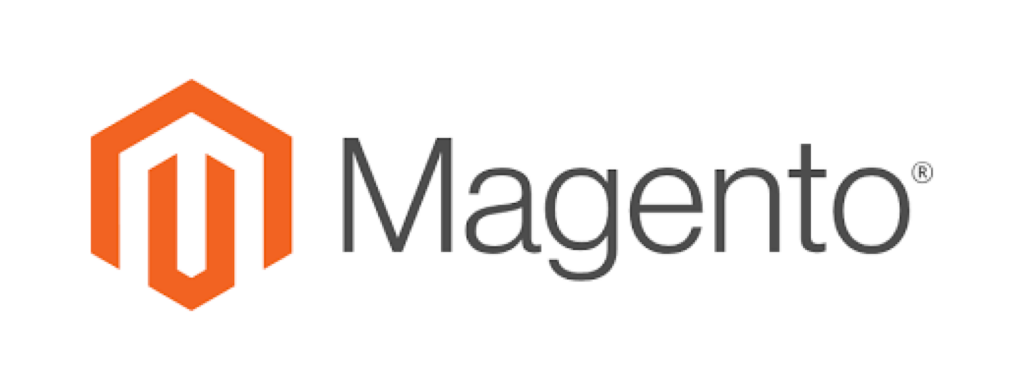
Magento is an open-source platform with powerful built-in features for establishing your online webshop. Since its release in 2008, it has been considered one of the most popular eCommerce platforms that serves big brands like Nike, Canon, Ford, and more.
Magento’s ability to scale with the business and inventory management capabilities makes it perfect for medium and large-size businesses. It provides numerous features for modifications and customization with extensive options for setting up and managing your webshop.
In addition, Magento manages multiple stores from a single dashboard, making it a preferable choice for businesses looking to expand. However, it can be costly due to its resource-intensive nature and the expenses associated with developing and maintaining your online store.
PrestaShop Overview

PrestaShop is also an open-source eCommerce platform that is known for its beginner-friendliness. The platform already serves 300,000+ shops worldwide and is available in 75 languages.
Its intuitive interface makes it a highly user-friendly eCommerce platform. PrestaShop is more suitable for small businesses as it offers options for managing customers, products, and orders. Also, it has the features like categorizing, tagging, and describing products to increase your online visibility.
This user-friendly eCommerce platform will assist you in enhancing and personalizing your online store. However, PrestaShop’s back-end management may be less straightforward than some other eCommerce platforms.
Additionally, With PrestaShop, you need to buy extra modules to expand the feature set of your online store that comes built-in with other platforms.
This is the basic overview of these platforms. The following section gives you more clarity on Magento vs PrestaShop by comparing them to different criteria.
Magento Vs PrestaShop — How They Stack Up Against Each Other?
This section covers a comprehensive comparison between Magento and PrestaShop for your better understanding.
| Aspect | Magento | PrestaShop |
| eCommerce Features | Availability of 2,500+ modules | Availability of 4,000+ modules |
| Cost | Free to download & install with no monthly fees | Free to download & install with no monthly fees |
| Designing | Offers 4 templates | Offer 2,500+ templates |
| Extendability | Access to the core file | Access to the core file |
| User Interface | Complex | User-friendly |
| SEO | SEO friendly | SEO friendly |
| Sales Commissions | No commissions | No commissions |
| Languages Supported | Supports +75 languages | Supports +75 languages |
| Multi-store Management | ✅ | ✅ |
| Theme & Extension Marketplace | ✅ | ✅ |
Now, join me for an in-depth comparison of Magento and PrestaShop. We’ll explore everything—from scalability to customization options.
1. Ease of Use
For eCommerce, you need a platform that allows you to set up a storefront quickly and efficiently. This helps you start selling your products or services easily and faster as well. So, let’s check if Magento or Prestashop offers better ease of store setup and management.
Magento is quite technical to consider for its ease of use. The platform will require you to hire a Magento developer to keep up with installation, configuration, and maintenance. However, its dashboard is more efficient for building an online store and works best on all aspects of store management.
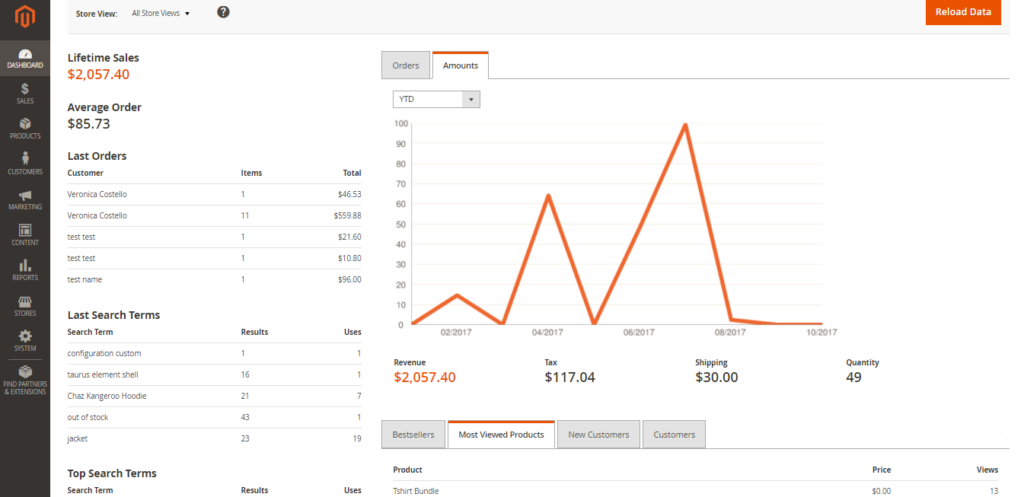
PrestaShop, when compared to Magento, is extremely easy to use. It comes with a simplified user interface that helps store owners manage their online store without needing technical knowledge.
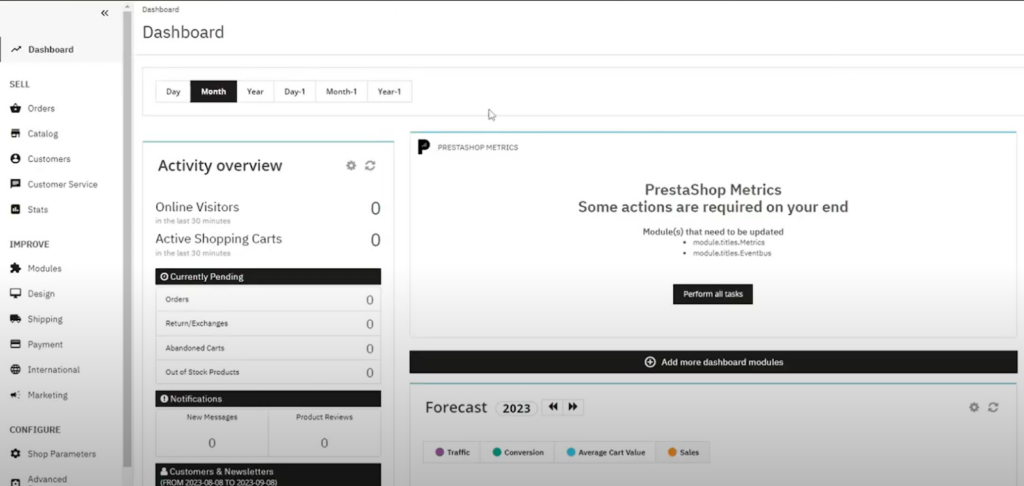
The dashboard of PrestaShop is easy to learn and offers quick access to all the information, settings, and performance of your website. Additionally, internal store features can be continually improved with an easy-to-use variety of modules within the PrestaShop marketplace.
So yes, Magento comes with technical intricacies, whereas PrestaShop is easier to set up and launch your online shop.
2. Pricing
Both Magento and PrestaShop offer flexible pricing models to accommodate businesses of varying sizes.
First of all, both of the platforms are open source, so yes, they do not charge any monthly fees. However, there are additional costs associated when you choose to build a store with them. So yes, it’s necessary to not only consider the initial costs but also ongoing expenses like hosting, development, and maintenance when comparing the overall price of each platform.
If we talk about Magento specifically, it has 2 paid plans (with its free plan) for larger enterprises looking for advanced built-in functionalities. They are known as Adobe Commerce and Adobe Commerce Cloud.
These plans come with a subscription fee based on annual revenue and offer additional features, support, and scalability.
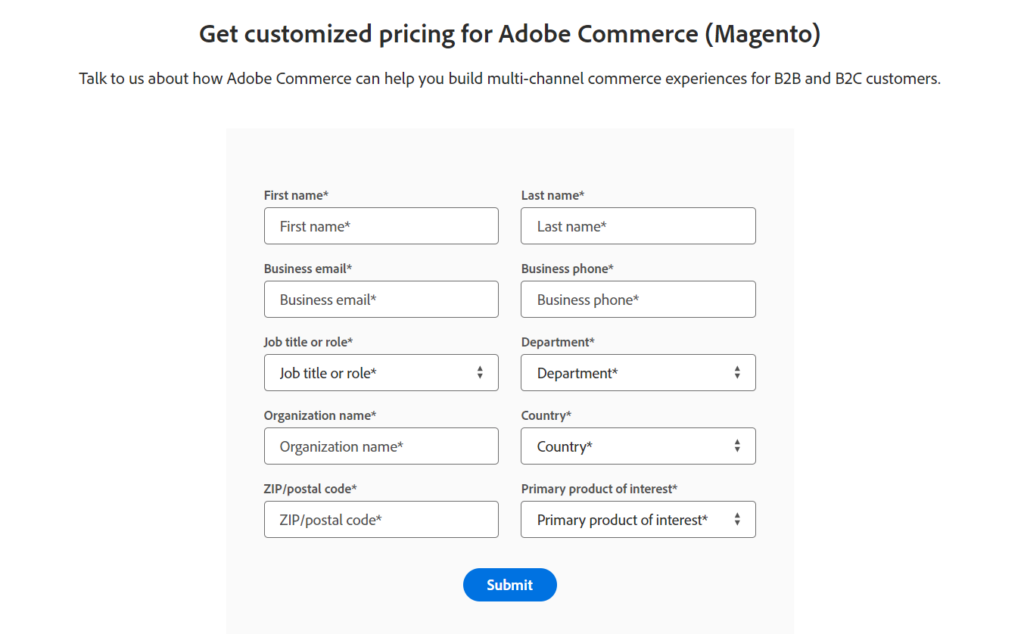
The subscription fees include hosting and providing an easy interface to build a store that includes drag and drop builder, pre-built sections, templates, advanced functionalities, B2B/wholesale capabilities, and more that help with efficient store management.
While Magento’s enterprise solutions cater to both medium to larger businesses with complex requirements, PrestaShop’s flexibility and lower barrier to entry make it a viable option for smaller to medium-sized enterprises. Ultimately, the best choice depends on the specific needs and budget of your business.
3. Themes
Both Magento and PrestaShop offer a variety of themes to help you design your online store.
Magento provides a more limited selection of official themes. However, you can choose from premium marketplaces like ThemeForest or TemplateMonster for a wider range of options.
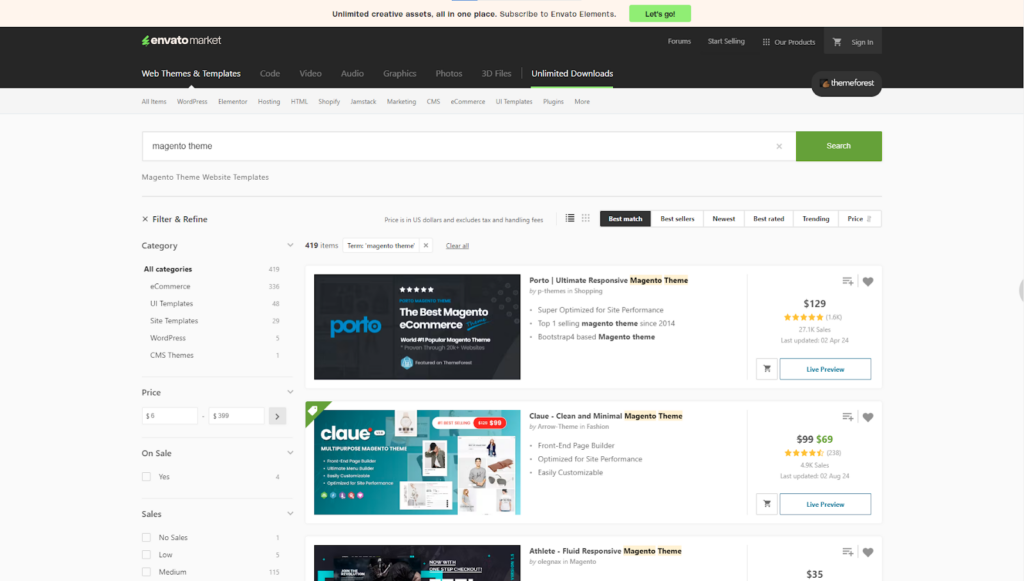
These third-party themes are compatible with Magento and help maintain a consistent look and feel all over your store.
On the other hand, PrestaShop comes with more elegant and professional themes. It gives users access to about 3200 pre-made themes. PrestaShop themes come with features like mobile-friendly, mega menu, custom colors & fonts, and many more.

It is also possible to buy themes from third-party vendors like themeforest.net.
All in all, both platforms have feature-rich themes that can help you customize your website design from scratch.
4. Plugins & Extensions
Plugins and extensions are vital components for further boosting the operation of your eCommerce websites. For complex marketplaces, a large range of paid and free Magento extensions are available.
Magento offers both free & paid 5000+ extensions that the Magento backend can easily integrate with. These extensions are divided into categories such as sales, marketing, accounts, and so on.
On the flip side, you get over 3000 plugins for your webshop at PrestaShop Addons Marketplace. This helps you quickly increase your shop’s capabilities with paid and free modules. You can easily integrate other eCommerce products into your webshop with its add-ons, enhancing its functionality.
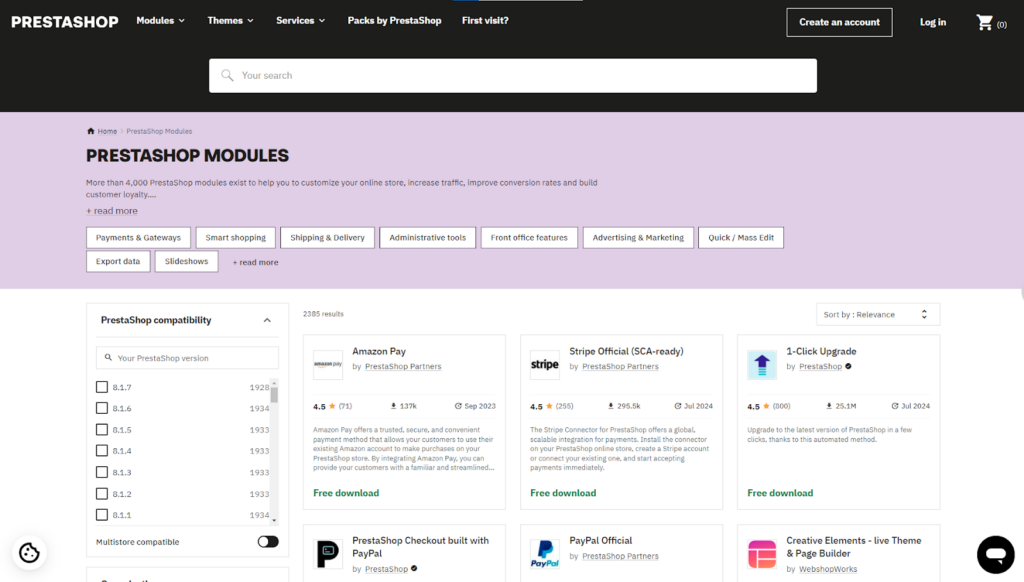
On the PrestaShop marketplace, the modules are arranged according to your objectives, like increasing traffic & customer satisfaction, optimizing conversions, and many others. They are also categorized by features such as payments, marketing & promotions, design, and more.
Ultimately, both platforms’ extensions allow you to add and customize vast functionalities to your webshop.
5. Performance & Scaling

Performance and scalability are critical factors for any eCommerce platform, especially as your business grows and traffic increases. Both Magento and PrestaShop offer unique advantages in these areas, largely due to their open-source nature, which allows for extensive customization and optimization.
Magento stands out as a highly scalable platform, capable of handling significant traffic spikes and large product catalogs with ease. Its robust architecture, when paired with quality development and high-performance hosting, enables merchants to optimize their sites for faster loading times and smooth user experiences.
As your business expands, Magento’s flexibility allows for advanced customizations, enabling your platform to scale efficiently with your needs.
PrestaShop, on the other hand, is often favored by small businesses. While it may not match Magento’s raw performance in high-demand environments, PrestaShop’s lightweight structure makes it a strong performer for businesses with smaller product catalogs and less complex customization needs.
The platform can handle increased traffic and product listings effectively, provided that it’s backed by solid server-side management and hosting.
Ultimately, both platforms can be optimized for performance and scalability, but the extent of that optimization heavily depends on the quality of development, server infrastructure, and hosting solutions.
As your business grows, Magento offers more robust tools for handling large-scale operations, while PrestaShop remains a reliable choice for smaller ventures aiming for efficient performance.
6. Security

Security is a big factor when choosing an eCommerce platform, as it directly impacts the safety of your customer’s data and the overall trustworthiness of your business. Both Magento and PrestaShop offer comprehensive security features, but there are key differences in how each platform handles core security measures.
Magento – Security
Magento is renowned for its robust security protocols. The platform regularly releases security patches, typically every 10 to 15 days, ensuring that your store is protected against the latest vulnerabilities. Magento’s built-in encryption standards, including strong data encryption and support for secure HTTPS/SSL protocols, provide an additional layer of security to safeguard sensitive information.
In addition to regular vulnerability patching, Magento supports PCI DSS (Payment Card Industry Data Security Standard) compliance, which is crucial for protecting payment information. The platform also offers tools for security audits and monitoring, allowing merchants to detect and address potential threats promptly.
Furthermore, Magento’s ecosystem includes a variety of third-party security extensions and built-in fraud detection tools, providing options for enhanced security tailored to your store’s specific needs.
PrestaShop – Security
PrestaShop also emphasizes security, offering a range of modules and features to protect your online store. The platform includes encryption protocols to secure data and supports PCI DSS compliance, ensuring safe payment processing. PrestaShop regularly updates its core software with security patches to protect against emerging threats.
The Official GDPR Compliance module is a notable feature in PrestaShop, ensuring your store adheres to European data protection regulations.
Additionally, modules like Protect My Shop help prevent code injections and content theft, crucial for maintaining the integrity of your store. While PrestaShop offers a solid security foundation, it may require additional third-party tools to match Magento’s advanced security capabilities fully.
Overall, both platforms provide essential security features, but Magento’s extensive range of security tools, regular updates, and a strong focus on compliance and fraud prevention give it an advantage, particularly for larger businesses with more complex security needs.
7. Marketing & SEO

Both Magento and PrestaShop come packed with SEO features to help boost your store’s search engine rankings. They include essentials like page titles, personalized URLs, sitemaps, meta descriptions, and 301 redirects.
With Magento’s SEO capabilities, your store gets a solid foundation of default functionalities that aid in improving search engine visibility.
Magento also offers an SEO toolkit that automates meta tag templates and creates unique product URLs, streamlining your SEO efforts. Plus, Magento 2 extends these features with options for managing content, communication, and promotions.
PrestaShop also equips you with a robust set of SEO tools to enhance your store’s search engine rankings and drive more traffic.
For marketing, both platforms offer features like newsletters, emails, and Google Adwords integration. These tools help increase your store’s visibility on social media and search engine results pages, making it easier to reach your audience and grow your business.
By leveraging these SEO and marketing features, both Magento and PrestaShop ensure that your online store is well-positioned to attract and retain customers.
8. Community Support

Before you make up your mind on the platform for your eCommerce store, it’s necessary to find a better source of support from the platform itself.
For Magento, the support depends on your chosen edition. If you’re choosing to get ahead with its OpenSource edition, you get community support through vast communities like Magento Forums, Magento DecDocs, and the help center. In contrast, technical support is included in the premium Magento edition. You can contact Magento experts via live chat, ticket, or email.
On the other hand, PrestaShop also provides support services through various plans. You can select the support package that best suits your needs.
Both Magento and PrestaShop offer documentation to solve the maximum number of queries their users have.
Lastly, both of the platforms are popular, so, their community on social media platforms like Reddit and Quora are quite active, where people often discuss installment, configuration, issues, and successful deployment of these platforms.
;
We’ve now covered a thorough comparison of Magento and PrestaShop across 8 different parameters, yet deciding on the best fit for your needs feels challenging.
For this, you need to have a greater understanding of your eCommerce business needs & requirements. So, let’s find out your business requirements and help you select the right platform.
Understanding Your eCommerce Business Needs
Both Magento & PrestaShop are excellent options for setting up and launching your eCommerce store from scratch. But there is always confusion about which one to choose. You can only choose the right platform when you know your eCommerce goals very clearly.
Now, don’t get overwhelmed by this; take a deep breath and consider thinking about the areas that I’ve added below:
1. Are you just starting your online business, or do you already have an established store?
It’s important to understand what stage of your business you are at, whether you are just starting your business or already have an established one.
If you are just starting your online business and want a beginner-friendly platform for establishing your online store, PrestaShop may be the best solution for you.
Whereas, if you already started your business and want to scale it to reach a broader audience, then you should go with Magento.
2. What is your catalog size? Do you anticipate significant growth in the future?
Catalog size matters a lot when choosing the right eCommerce platforms, as different platforms have different capabilities for managing product listings.
If your online store has fewer listed products, then it means your catalog size is relatively small, and you seek a platform like PrestaShop, as it is ideal for smaller catalogs.
However, if your store has larger catalogs with the vision of significant growth in the future, then Magento will work best for your business.
3. Do you need a highly customized storefront experience to differentiate your brand?
Make sure to analyze your business and figure out the kinds of features or the level of customization needed to stand out from the competitor’s crowd.
If your eCommerce store needs extensive customization to differentiate your brand, then Magento is the perfect platform for your business. PrestaShop, on the other hand, does provide customization for eCommerce stores, but may not compete with the offerings of Magento.
Magento offers advanced customization features like flexible product catalogs, the ability to scale a business, and extensive third-party integrations. These capabilities provide a higher level of control and personalization compared to PrestaShop, giving Magento an edge for businesses with more technical needs.
4. Do you have an in-house team of developers, or are you looking for a user-friendly platform?
If you are willing to team up with developers to deploy an eCommerce webshop, then Magento is perfect as it requires technical or programming expertise.
However, if you don’t want to hire in-house developers and want a more user-friendly platform that can be managed without a developer’s expertise, then PrestaShop can be your go-to choice.
5. What is your budget for setting up and maintaining your eCommerce platform?
Both platforms have their pricing and different features. On the one hand, there is Magento, whose cost can be quite high, including hosting, themes, and extensions; on the other hand, PrestaShop comes up with lower upfront costs.
A gentle consideration of your budget can help you choose the best platform for your eCommerce business.
6. Are you seeking advanced eCommerce functionalities for your business?
Well, Magento & PrestaShop offer all the essential functionalities for your eCommerce. But if you are seeking advanced functionalities for your eCommerce platform, then you should choose Magento as it comes with features like Pagebuilder, GraphQL, live search, and more.
Whereas PrestaShop has features like creating and managing products and reducing abandoned carts, they are more basic. Overall, these considerations will help you better understand your business needs when selecting the right platform for your eCommerce store.
I hope you have understood how to consider your business needs, so let’s move on to the last section of this blog where we make our final decision on the platform.
Is Magento or PrestaShop Better For Your eCommerce Business?
Both Magento and PrestaShop are great options for building your eCommerce store.
Magento provides more flexibility, scalability, and advanced customization options and is ideal for medium to large businesses. PrestaShop is more beginner-friendly, thanks to its simple and intuitive interface, and it is suitable for small businesses.
While both platforms are excellent, Magento stands out with its scalability and advanced functionalities, which provide everything in one platform that any eCommerce store seeks.
So, how do you decide on which eCommerce platform you’ll need to invest in for the best results? Well, it heavily depends on your business requirements.
- If you need a more affordable platform that offers lower upfront costs and a user-friendly interface, PrestaShop is the best choice for you.
- However, if you need a more scalable platform with advanced functionalities and budget is not the major concern, Magento is perfect for you.
In the end, whatever you choose, decide after reading their official documentation, reviews, and case studies, and only then choose any eCommerce platform.
I hope this blog has provided enough information and clarity on choosing between Magento and PrestaShop. If you have any queries, feel free to write back to us.
Moreover, if you’re looking to get ahead with Magento and still have lingering doubts, our Magento experts can provide the best assistance. Looking forward to hearing from you. 😀
Magento Vs. PrestaShop — FAQs
1. Is Magento beginner-friendly?
No, not really, compared to PrestaShop. It requires some technical or programming skills to understand its functionalities. However, it’s quite extensible, flexible, and scalable.
2. What is the main difference between Magento and PrestaShop?
The main difference lies in offering scalability and advanced functionalities, where Magento has an edge over PrestaShop. PrestaShop is suitable for small businesses, while Magento works better for business owners with all businesses small to large.
3. What are the benefits of PrestaShop over Magento?
PrestaShop is generally easier to install than Magento, making it a more accessible option for those with less technical expertise. It also simplifies daily store management tasks such as ordering, product descriptions, and categorization.
These features make PrestaShop a user-friendly choice for managing an online store efficiently.
4. Is Magento more expensive than PrestaShop?
The operational costs of Magento and PrestaShop are quite similar. However, PrestaShop has lower upfront costs, while Magento can be costly with all the investment in hosting, theme, and extensions.
5. Which platform, Magento or PrestaShop, has a larger user and developer community?
Magento has a larger user and developer community than PrestaShop. However, both platforms are very popular and have their documentation to solve users’ queries.






Post a Comment
Got a question? Have a feedback? Please feel free to leave your ideas, opinions, and questions in the comments section of our post! ❤️